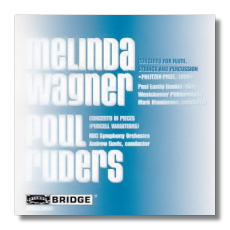
The Internet's Premier Classical Music Source
Related Links
- Latest Reviews
- More Reviews
-
By Composer
-
Collections
DVD & Blu-ray
Books
Concert Reviews
Articles/Interviews
Software
Audio
Search Amazon
Recommended Links
Site News
 CD Review
CD Review
Melinda Wagner / Poul Ruders

Concertos
- Melinda Wagner: Concerto for Flute, Strings, and Percussion (24:30)
- Poul Ruders: Concerto in Pieces "Purcell Variations" (17:14)
Paul Lustig Dunkel, flute
Westchester Philharmonic Orchestra/Mark Mandarano
BBC Symphony Orchestra/Andrew Davis
Bridge 9098 DDD 55:51 Includes interviews with Ruders & Wagner
This CD introduces two very entertaining and worthwhile works written in the past five years. Melinda Wagner's concerto even won the Pulitzer Prize in 1999, so I am not alone in finding merit in it. Wagner was born in 1957 and studied with Richard Wernick, George Crumb, and others. It was her challenge to write a work with a full sound, yet one in which the orchestra would not bury the flute. As models, she turned to Bartók's Music for Strings, Percussion, and Celesta, and to Bernstein's Serenade. The resulting 24-minute concerto gives the flute plenty of room to maneuver, but it also succeeds as a display piece for the orchestra (especially the percussion) which is called upon to produce a galaxy of shimmering sounds. The first movement, marked "Playful," never rests for very long. The soloist is like a jeweled butterfly fluttering through an orchestral forest of lights. Two themes are prominent: a jagged fanfare, and a long descending line that the composer compares to a sigh. "Sad, simple; warm" is how Wagner describes the second movement, a thoughtful interior world colored by sensitive writing for solo strings. It is quiet, but it builds in intensity, and the final minutes are beautifully scored for gleaming high strings and percussion, including harp, glockenspiel, and other bells. The quick finale has a fuller sound than elsewhere in the concerto. It is brilliant and a little nervous, and it is an apt finish for what has come before. This concerto will give contemporary flutists a challenge, and yet it has the potential to please any audience. Dunkel, who requested the work, plays it beautifully, and the Westchester Philharmonic provides first-class support. I am looking forward to hearing more of Wagner's music.
Poul Ruders is a more familiar figure, thanks in no small part to Bridge's several recordings of his music. Concerto in Pieces was a BBC commission to recognize the 300 years since Henry Purcell's death, and the 50 years since Britten composed The Young Person's Guide to the Orchestra (a work based on a theme by Purcell). Ruders chose a cackling chorus of witches from Purcell's Dido and Aeneas as a theme for Concerto in Pieces. This work is a showpiece for orchestra (both whole and in parts) and a demonstration of the possibilities inherent in disassembling and reassembling the theme – thus Ruders' title, I suppose. Overall, the work has a mocking, ironic character (and a provocatively abrupt ending) that fits Purcell's theme. There are ten variations, and the alto saxophone, tuba, harp, and trumpet get juicy star turns. Ruders pulls in other fragments from the opera to knit the work together. According to Ruders, his artistic goals are to entertain, enrich, and disturb, and he has done all three in Concerto in Pieces. The performance seems exactly right, and the engineering is a gorgeous ear-bath. (Wagner's concerto also is helped by great sound.)
Together, both works require less than 42 minutes to play. Bridge has tried to add value by including six-minute interviews with each composer; the interviewer in both cases is David Starobin, who, with his wife Becky, is the driving force behind Bridge Records. The interviews are moderately interesting – the composers discuss their earliest musical experiences and the background to their featured works – but they are clearly makeweights.
Copyright © 2000, Raymond Tuttle




















